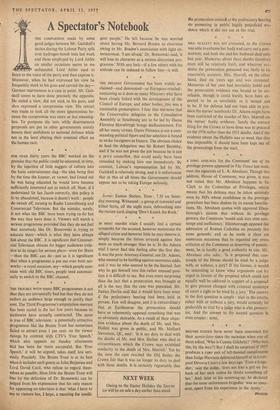FOR OVER thirty years the BBC worked on the premise
that the public could be educated, in time, by the injection of little nuggets of culture into the basic entertainment• slag—the idea being that by the time the listener, or viewer, had found out he was being educated he would have become sufficiently interested not to switch off. Now, if I understand Sir Ian Jacob correctly, this policy is to be abandoned, because it doesn't work : people do switch off, turning to Radio Luxembourg and Commercial Television. But the mistake, surely, is not what the BBC have been trying •to do but the way they have done it. Viewers will watch a serious programme provided that they do not feel that somebody like Dr. Bronowski is trying to educate them—which is what they have always felt about the BBC. It is significant that Commer- cial Television obtains far bigger audiences (rela- tive to its range) for serious plays—even for Ibsen —than the BBC can do—just as it is significant that when a programme is put out over both net- works—a royal occasion, say—which people asso- ciate with old BBC times, people tend automati- cally to switch to the BBC channel.


































 Previous page
Previous page